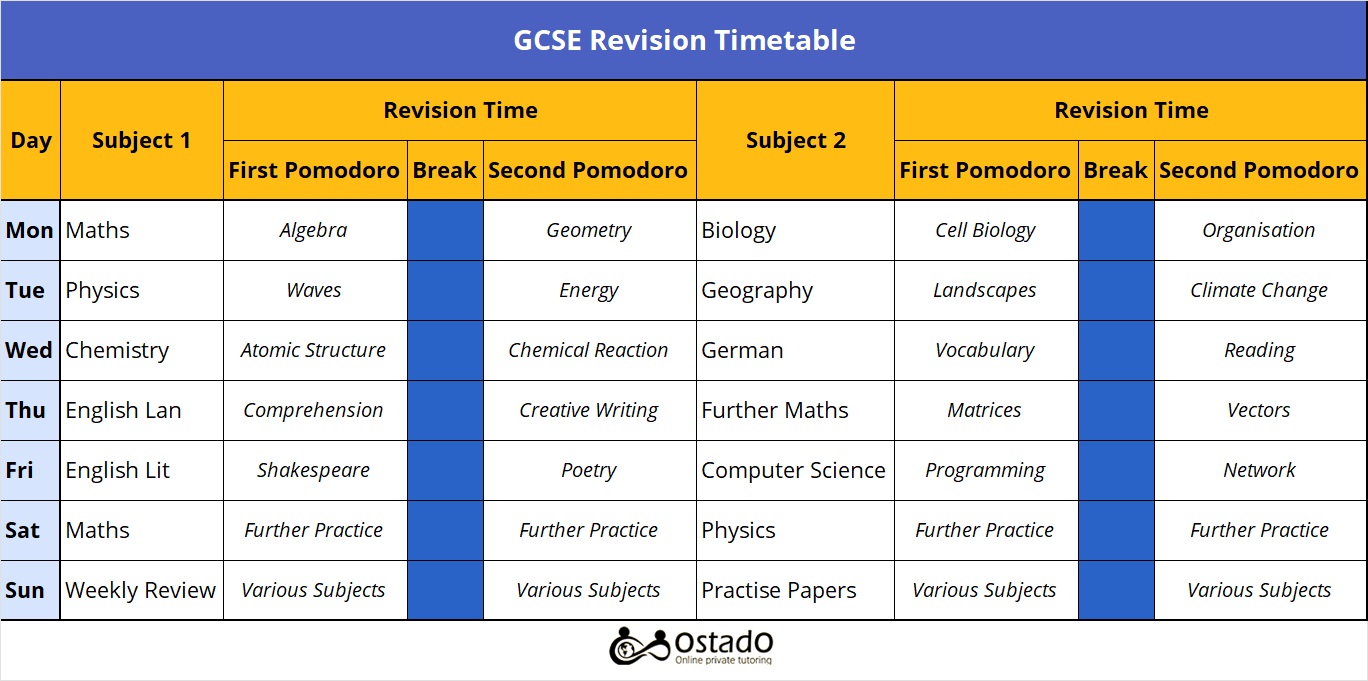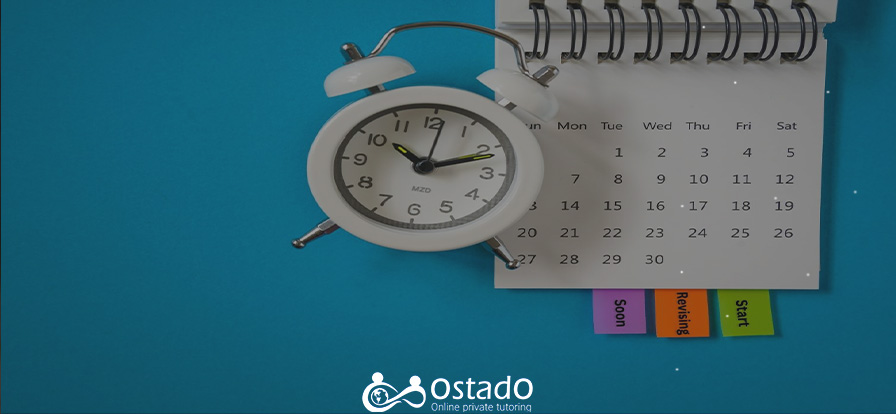Good GCSE grades lay the foundation for A-levels, and good A-levels pave the way to top universities and excellent job opportunities. But getting good GCSE grades isn’t that easy. Students need to make a comprehensive plan to take firm steps forward, and such a plan takes time to yield good results.
Students should devise a revision timetable early on to have enough time to cover all GCSEs. All revision guidelines tell students to start revising six months before their exam, but they don’t tell them how. Let’s find out when to start GCSE revision and look at an exemplary six-month revision timetable.
Why Start Six Months Before Your GCSE Exams?
The sooner students start your revision plan, the more time they have to comprehend all topics. On the contrary, if they leave the revision to the final month, the most they can do is memorise the lessons, and they might not even be able to cover all the lessons.
Additionally, starting early gives students more control over the revision process, and they feel more relaxed when things are under control. But last-minute cramming leads to frustration and impedes your productivity.
Finally, when students start CSE preparation six months before the GCSE exam dates 2025, not only do they have the time to revise all GCSE subjects, but they also find the time to review their plans and practise past papers to better retain the information in their long-term memory.
What To Revise in Six Months?
Six months might seem like a long time, but it becomes justified when you consider the bulk of the materials to be revised.
Usually, GCSE students do 8-10 GCSEs to have a wide range of choices for further education and career prospects. If students start the revision six months before the exam season, they will have enough time to cover 10 GCSE subjects.
Let’s go deeper with an example. Suppose a student aims to continue their education or find a career in STEM subjects. An ideal selection of GCSEs for this student is as follows.
- Maths
- English Language
- English Literature
- Physics (Separate Science)
- Chemistry (Separate Science)
- Biology (Separate Science)
- Further Maths
- Computer Science
- Geography (or History)
- A Modern Foreign Language
Example Revision Timetable
If students start the GCSE preparation six months before the exams, they can wrap up the daily revision in 2 to 3 hours and 3 to 4 hours on weekends and holidays. The revision timetable for a student starting six months before the exam looks like the revision schedule below.
This timetable is based on the Pomodoro Technique, and the focus is on the revision period rather than when you do it. So, try to revise whenever you’re at your best.
You can create a revision timetable of your own and customise it in different ways. For example, you can have three Revision Times instead of two, or you can change the subjects and topics for each day based on your study needs.
Click here to download this Pomodoro-based revision timetable. You can download more daily and weekly GCSE revision timetable templates here.

Benefits of a Six-Month Revision Timetable for GCSE Exams
- The student has enough time to revise all ten GCSE subjects.
- They just need to revise two subjects a day.
- Two daily Pomodoros (25-minute revision period) are enough for each subject.
- Weekends can be used to review what you’ve studied during the week and practise past papers.
- There is enough time to spend extra on challenging subjects like Maths and Physics.
- If the student falls behind the schedule for any reason, s/he can get back on track without much difficulty.
- The plan maximises the student’s preparedness for the exam and boosts their confidence.
GCSE maths exams are usually challenging for most GCSE students. We have covered some points in “Best Way To Revise for GCSE Maths” to help students address these challenges and get excellent grades in GCSE maths.
When To Start GCSE Revision?
So far, we have focused on a six-month revision span for an effective revision plan, but students can still do it if they start the revision later. Let’s say they start the revision three months before the exam season. This means their revision timetable gets two times more intensive.
That is, they should spend longer hours revising each day, and they will virtually miss most holidays since they may need to revise for 6 to 7 hours a day. Overall, the later you start revising for GCSEs, the more time you have to revise in a day.
Moreover, cramming the revisions into the last weeks, leading to the GCSE exams, is quite frustrating, and students can’t show their best performance under that much stress. So, while it’s possible to revise later than six months before the exams, we strongly suggest you not to.
GCSE Revision Tips
The most important part of pursuing GCSE success is planning, which we covered above. Now, let’s go over some tips students can benefit from in order to make the revision more productive. Since we have covered GCSE preparation tips in “How To Get Good Grades in GCSE” in detail, I will just point them here.
Develop Good Study Habits
Good study habits are the ones that align with your learning style. So, if you’re an aural learner, revision podcasts are the best choice. There are also many revision videos on YouTube you can watch to prepare for GCSE exams.
Students should also consider their general lifestyle to develop good study habits. For instance, if they are a morning person, they should do the bulk of revision in the morning and deal with the subjects that are more challenging for them.
Use Different Resources
Don’t rely on a single revision resource type. Revision books, podcasts, videos, websites, etc., can help students approach GCSE revision from different angles. In other words, diversifying GCSE resources helps students know GCSE subjects like the palm of their hand. We have collected the best GCSE resources in another article. Click on “Best Revision Books for GCSE” to learn more.
Get Help from a Tutor
Preparation courses and tuition are key to a successful revision plan. Private tutors can spend as much time as you need to fully understand a complex subject using methods that match your learning style.
Ostado’s GCSE tutors and academic supporters can help you stay productive and motivated throughout the revision period and lead you to the desired results. You can book a free trial with your preferred GCSE tutor to see how they can lighten the burden of revisions on the student’s shoulder.
Employ Proper Revision Methods
In order to make the revision process more enjoyable, you should engage yourself in the process. Taking notes, summarising, highlighting keywords, recording your voice, and walking while reading are some of the ways you can do to make yourself more involved.
Practice Past Papers
Past GCSE papers are great assets that familiarise the students with the GCSE exams. The best time to practise past papers is 2 months before the exams. You can test yourself to identify your knowledge gaps and fill them in time for the exams.
In order to get the most out of practising previous exam papers, students should simulate the exam session conditions. For instance, they should time themselves and see how they perform under time constraints.
Join a Study Group
When you are in a crowd that shares your goals, concerns, and situation, you’re motivated to keep up the good work in the face of challenges. You can also apply cooperative learning methods in a study group to increase engagement and productivity.
Balance Revision Sessions With Activities
Academic success doesn’t have to rob a student of the pleasures of teenagehood. When they start GCSE preparation early enough, they can achieve academic excellence while attending to their personal lives. Remember, slow and steady wins the race.

